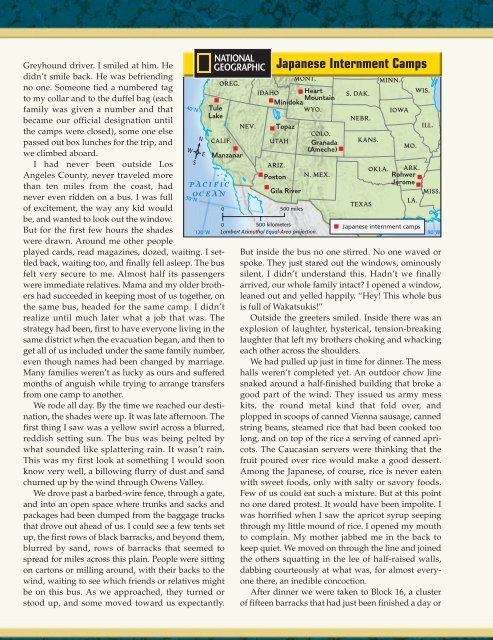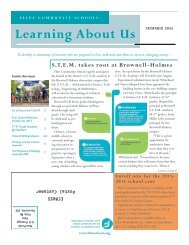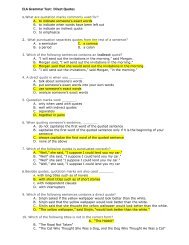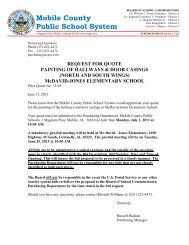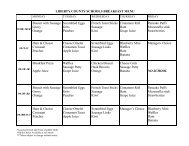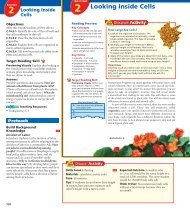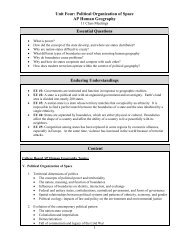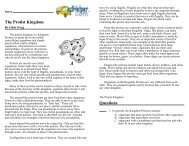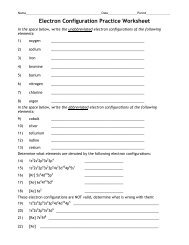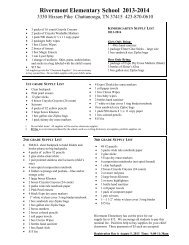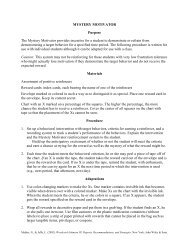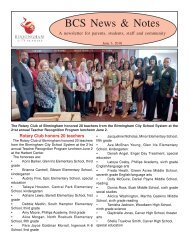Chapter 12: America and World War II, 1941-1945 - Georgia ...
Chapter 12: America and World War II, 1941-1945 - Georgia ...
Chapter 12: America and World War II, 1941-1945 - Georgia ...
You also want an ePaper? Increase the reach of your titles
YUMPU automatically turns print PDFs into web optimized ePapers that Google loves.
Greyhound driver. I smiled at him. He<br />
didn’t smile back. He was befriending<br />
no one. Someone tied a numbered tag<br />
to my collar <strong>and</strong> to the duffel bag (each<br />
family was given a number <strong>and</strong> that<br />
became our official designation until<br />
the camps were closed), some one else<br />
passed out box lunches for the trip, <strong>and</strong><br />
we climbed aboard.<br />
I had never been outside Los<br />
Angeles County, never traveled more<br />
than ten miles from the coast, had<br />
never even ridden on a bus. I was full<br />
of excitement, the way any kid would<br />
be, <strong>and</strong> wanted to look out the window.<br />
But for the first few hours the shades<br />
were drawn. Around me other people<br />
40°N<br />
played cards, read magazines, dozed, waiting. I settled<br />
back, waiting too, <strong>and</strong> finally fell asleep. The bus<br />
felt very secure to me. Almost half its passengers<br />
were immediate relatives. Mama <strong>and</strong> my older brothers<br />
had succeeded in keeping most of us together, on<br />
the same bus, headed for the same camp. I didn’t<br />
realize until much later what a job that was. The<br />
strategy had been, first to have everyone living in the<br />
same district when the evacuation began, <strong>and</strong> then to<br />
get all of us included under the same family number,<br />
even though names had been changed by marriage.<br />
Many families weren’t as lucky as ours <strong>and</strong> suffered<br />
months of anguish while trying to arrange transfers<br />
from one camp to another.<br />
We rode all day. By the time we reached our destination,<br />
the shades were up. It was late afternoon. The<br />
first thing I saw was a yellow swirl across a blurred,<br />
reddish setting sun. The bus was being pelted by<br />
what sounded like splattering rain. It wasn’t rain.<br />
This was my first look at something I would soon<br />
know very well, a billowing flurry of dust <strong>and</strong> s<strong>and</strong><br />
churned up by the wind through Owens Valley.<br />
We drove past a barbed-wire fence, through a gate,<br />
<strong>and</strong> into an open space where trunks <strong>and</strong> sacks <strong>and</strong><br />
packages had been dumped from the baggage trucks<br />
that drove out ahead of us. I could see a few tents set<br />
up, the first rows of black barracks, <strong>and</strong> beyond them,<br />
blurred by s<strong>and</strong>, rows of barracks that seemed to<br />
spread for miles across this plain. People were sitting<br />
on cartons or milling around, with their backs to the<br />
wind, waiting to see which friends or relatives might<br />
be on this bus. As we approached, they turned or<br />
stood up, <strong>and</strong> some moved toward us expectantly.<br />
N<br />
W E<br />
S<br />
PaCIFIC<br />
OCEaN<br />
30°N<br />
<strong>12</strong>0°W<br />
Tule<br />
Lake<br />
OREG.<br />
CALIF.<br />
Manzanar<br />
0<br />
NEV.<br />
IDAHO Heart<br />
Mountain<br />
Minidoka<br />
WYO.<br />
ARIZ.<br />
500 miles<br />
MONT.<br />
0<br />
500 kilometers<br />
Lambert Azimuthal Equal-Area projection<br />
Japanese Internment Camps<br />
Topaz<br />
UTAH<br />
Poston<br />
Gila River<br />
COLO.<br />
Granada<br />
(Ameche)<br />
N. MEX.<br />
S. DAK.<br />
NEBR.<br />
KANS.<br />
MINN.<br />
IOWA<br />
MO.<br />
Japanese internment camps<br />
WIS.<br />
ILL.<br />
OKLA. ARK.<br />
Rohwer<br />
Jerome<br />
MISS.<br />
LA.<br />
TEXAS<br />
90°W<br />
But inside the bus no one stirred. No one waved or<br />
spoke. They just stared out the windows, ominously<br />
silent. I didn’t underst<strong>and</strong> this. Hadn’t we finally<br />
arrived, our whole family intact? I opened a window,<br />
leaned out <strong>and</strong> yelled happily. “Hey! This whole bus<br />
is full of Wakatsukis!”<br />
Outside the greeters smiled. Inside there was an<br />
explosion of laughter, hysterical, tension-breaking<br />
laughter that left my brothers choking <strong>and</strong> whacking<br />
each other across the shoulders.<br />
We had pulled up just in time for dinner. The mess<br />
halls weren’t completed yet. An outdoor chow line<br />
snaked around a half-finished building that broke a<br />
good part of the wind. They issued us army mess<br />
kits, the round metal kind that fold over, <strong>and</strong><br />
plopped in scoops of canned Vienna sausage, canned<br />
string beans, steamed rice that had been cooked too<br />
long, <strong>and</strong> on top of the rice a serving of canned apricots.<br />
The Caucasian servers were thinking that the<br />
fruit poured over rice would make a good dessert.<br />
Among the Japanese, of course, rice is never eaten<br />
with sweet foods, only with salty or savory foods.<br />
Few of us could eat such a mixture. But at this point<br />
no one dared protest. It would have been impolite. I<br />
was horrified when I saw the apricot syrup seeping<br />
through my little mound of rice. I opened my mouth<br />
to complain. My mother jabbed me in the back to<br />
keep quiet. We moved on through the line <strong>and</strong> joined<br />
the others squatting in the lee of half-raised walls,<br />
dabbing courteously at what was, for almost everyone<br />
there, an inedible concoction.<br />
After dinner we were taken to Block 16, a cluster<br />
of fifteen barracks that had just been finished a day or<br />
CHAPTER <strong>12</strong> <strong>America</strong> <strong>and</strong> <strong>World</strong> <strong>War</strong> <strong>II</strong> 595


